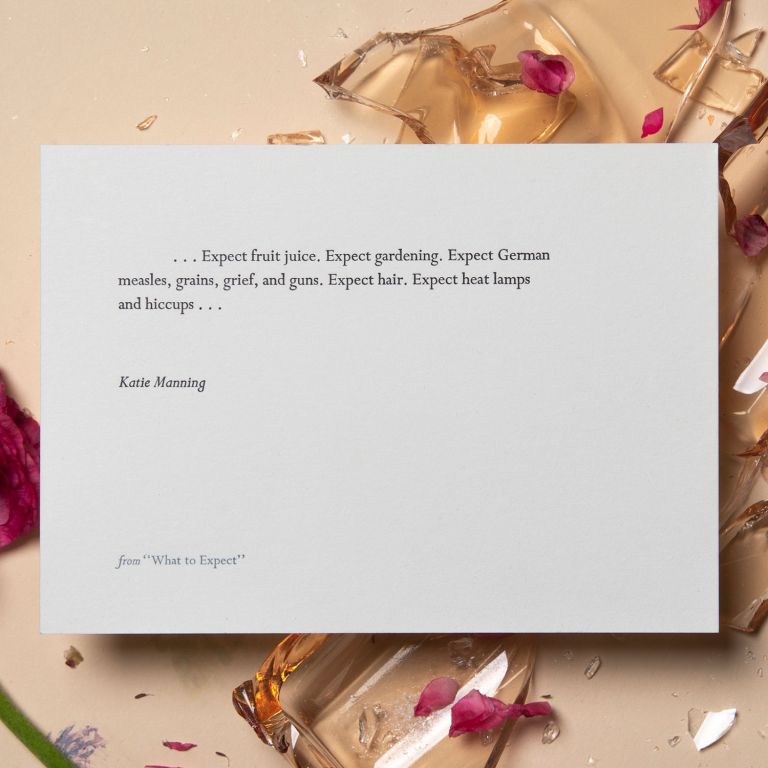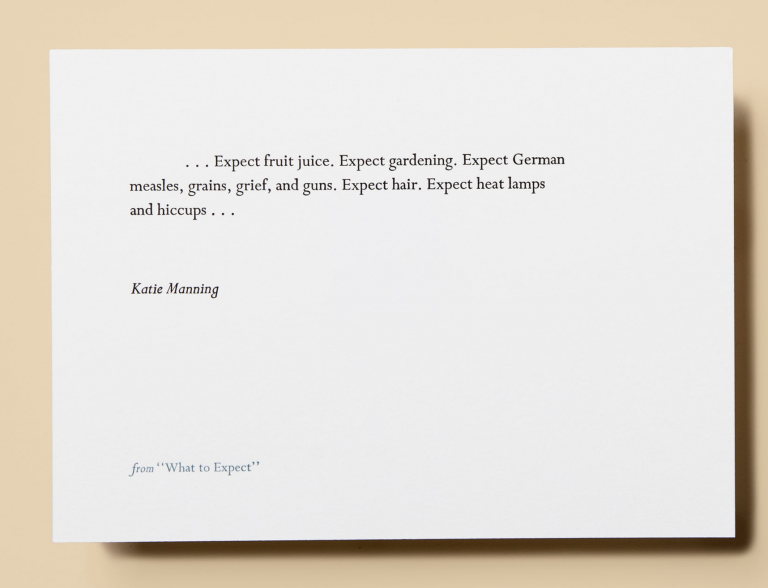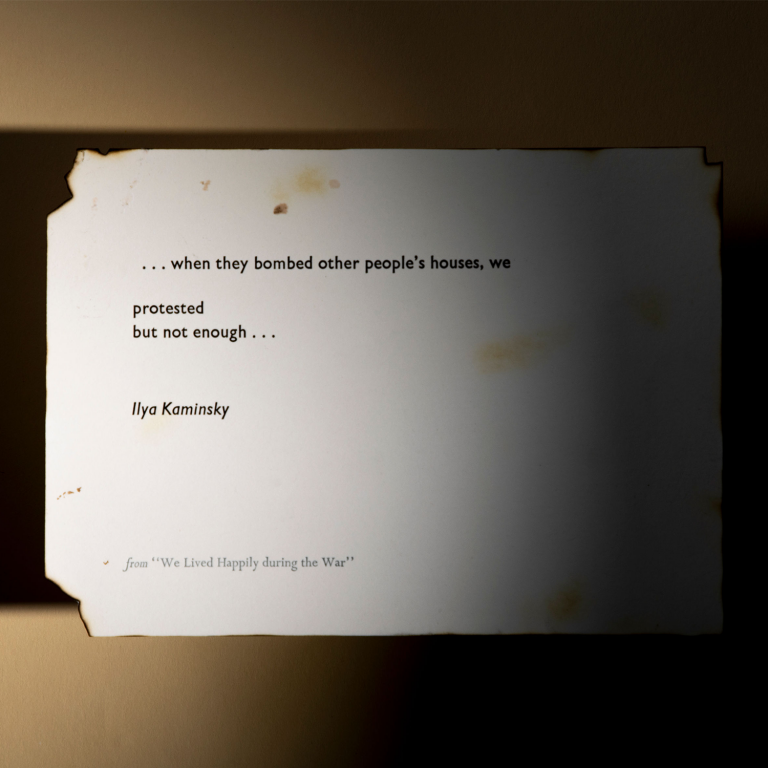Katie Manning
What to Expect
This poem stretches the word ‘expect’ into dozens of formulations. Proceeding alphabetically through the index of the book, “What to Expect When You’re Expecting,” Katie Manning creates an exhausting list of all the expectations created during pregnancy,about rejecting some pressures and embracing others; surviving some, being knocked over by others. The humor and pace of this poem places insight alongside insidiousness.

Letterpress prints by Myrna Keliher | Photography by Lucero Torres © All Rights Reserved.
Guest

Katie Manning is the founding editor-in-chief of Whale Road Review and a professor of writing at Point Loma Nazarene University in San Diego. She is the author of Tasty Other, which won the 2016 Main Street Rag Poetry Book Award, and her fifth chapbook, 28,065 Nights, is available from River Glass Books. Her poems have appeared in American Journal of Nursing, december, The Lascaux Review, Kahini Quarterly, and many others. Find her online at www.katiemanningpoet.com.
Transcript
Pádraig Ó Tuama: Hello, Poetry Unbound listeners. Pádraig here with a little announcement before the show begins. This is the last episode of Season 3—I know, we’re sad too. But don’t worry, Season 4 starts at the end of September, and we’re excited for that. And, of course, On Being is in your podcast feed every week. But we also want to let you know about Poetry Unbound Plus. It’s a series of four episodes, in collaboration with our friends at the Washington National Cathedral, where I am in conversation with poets whose work engages with biblical literature and the characters in that literature. Four brilliant poets are part of that series: Mary Karr, David Kinloch, Lorna Goodison, and Diane Glancy. You can find links to those episodes in our show notes, or on our On Being channel on YouTube. Thanks, as always, for being with us in Poetry Unbound, and onto the show.
My name is Pádraig Ó Tuama. And one time, I was at a party, and it was one of those parties where there was all kinds of story games at it, and people were told to say something that had surprised them. And there was a woman at the party who said, “Before I came out to this party, I said to my 16-year-old son, could he do something for me? And he looked at me gently and said, ‘No.’” And she said, “I always wanted babies. I never realized I’d get adults.” And I looked at her and thought, I’m so foreign to this experience. And I felt like she was telling us a poem, in the way that she was narrating the story of her life.
[music: “Praise the Rain” by Gautam Srikishan]
“What to Expect” by Katie Manning, a poem made of items “found in the index [of the book] What to Expect When You’re Expecting”:
“Expect accidents. Expect acne, additives, age, and airbags. Expect alcohol, allergies, and altitude. Expect analgesics. Expect animals, ankles, and antidepressants. Expect autopsy findings. Expect bathing, bending, botanicals, and breaking news. Expect bruises. Expect cabbage leaves. Expect castor oil and cats. Expect cell phones, chemicals, Chlamydia, and clay. Expect cleaning products, cocaine, and cold weather. Expect computer monitors. Expect copper, costs, and coughing exercises. Expect dance workouts and death. Expect diving, Doppler, driving, and dromedary droop. Expect embarrassment. Expect electric blankets and equal employment. Expect eyes and facials. Expect failure, fantasies, fast food, and feet. Expect fig bars, fingernails, fish, flying, football, and freckles. Expect fruit juice. Expect gardening. Expect German measles, grains, grief, and guns. Expect hair. Expect heat lamps and hiccups. Expect hiking, horseback riding, hot tubs, and hot weather. Expect hypnosis. Expect ice skating, insect repellent, and itching. Expect jet lag and jogging. Expect kick-boxing. Expect K-Y jelly. Expect lacerations and laser eye surgery. Expect lead exposure and lovemaking. Expect manicures, marijuana, masks, and meat. Expect meditation, milk aversion, and moles. Expect mosquito bites and music. Expect nasal strips. Expect nicotine patches, noise, and NutraSweet. Expect on-line drug shopping. Expect optimism. Expect organ donation and organic produce. Expect outside influences. Expect paint fumes, pasteurization, peanuts, pesticides, and pets. Expect pins and needles. Expect raspberry leaf tea. Expect red palms, reduction, religious belief, and rest. Expect ribs, ripening, and risk. Expect rowing machines. Expect saddle block. Expect safety, saliva, and salt. Expect scalp stimulation and scuba diving. Expect seat belts, sex, and shoes. Expect skiing and skin sampling. Expect smells. Expect softball, stockings, and stomach bug. Expect sugar, sunblock and sushi. Expect tai chi, tears, teeth, and ticks. Expect toes, touching, train travel. Expect vaporizers, vegetables, and vision. Expect warts and water, workouts and witch hazel. Expect x-rays. Expect yoga and zinc.”
[music: “Into the Earth” by Gautam Srikishan]
So this poem is a collection of items that are found in the index of the book What to Expect When You’re Expecting, which is a book that has, I think, 19 million copies in circulation at the moment, through various iterations. There’s been loads and loads of editions and updates and edits, and things have been taken out and things have been put in. And Katie Manning is not a fan of this book, and the way that she takes this random series of items from the index and puts it together in a sequence I think is demonstrative of a critique she’s wanting to give of that kind of literature, as well as her experience of that kind of literature. It comes in a book, this poem does, a book that’s exploring the experience of motherhood for her and a book that is sometimes pushing back against the idea about what mothers are expected to be and what is put upon women who are mothers. And this poem is part of a sequence of defiance, really, throughout that entire book.
I think by arranging a poem like this, the art of this is for Katie Manning to make a sequence of expectations that on the one hand seem random, but on the other hand are held in strange adjacencies. So you think of “failure” and “fantasies” — that is a powerful thing to say about what it’s like to be human. “Electric blankets and equal employment” — the irony of placing these side-by-side, comfort for a warm bed, and justice for equal pay, and, of course, the fact that women can’t expect equal employment. This poem is taking stuff that’s said to expect, and holding a mirror up to say, who says that we should expect this? Who says we should settle for this? And who said that this level of expectations that’s being put on women and being put on mothers is a justice level of expectation
Expect “grief, and guns” — here, I think, her arrangement is loud and clear in its irony and, I think it’s fair to say, in its accusation as well, not just of an industry, but perhaps of a country. “Lead exposure and lovemaking,” “on-line drug shopping,” “optimism” — optimism and “organ donation and organic produce” — putting all of those things together, all kinds of ironic pairings. Sometimes [laughs] I feel like this poem is a squirming body of a child, at once half-grown-up and, on the other hand, desperate for love. And this is exhausting, as a poem, to say, and exhausting as a poem to hold. And, I mean, I’m not a parent, and I’ll never be pregnant, and I think one of the things that this poem says to me is how uncomfortable it is to be a person upon whom all these expectations are placed.
[music: “Waterborne” by Blue Dot Sessions]
This poem knows that anything might happen. And in the arrangement of this, it’s slightly overwhelming. And I think that’s part of the point. I don’t think this poem is trying to overwhelm people; I think this poem is trying to say this is what it’s like to be overwhelmed. There are lots of people who have said that the book What to Expect When You’re Expecting has given them useful information, and when a complication came along, it helped them be aware, “Oh, this is something I should be concerned about.” And there are plenty of other people who have not found that book helpful and actually felt that the book was curating them into a sense of anxiety about how a culture wants people to have babies but then doesn’t treat the people who are having babies with a level of support, a level of equal employment, a level of respect.
Some people have nicknamed the book What to Expect When You’re Expecting, they’ve nicknamed it What to Freak Out About When You’re Expecting because it gives you all of the ways within which everything can go wrong. And I think, while this can be true — lots of things can go wrong, and this poem knows this — the poem is asking the question, why is it that it is only people who are going to be pregnant that are having this level of expectation put on them? For some people, the book How to Win Friends and Succeed is written, and for other people, What to Freak Out About When You’re Expecting is written. And this, I think, is a gendered critique and an embodied critique of the question of whose anxiety is manufactured into a capitalist project, in the context of the books that sell well and in the context of the books that are promoted. And this, I think, is a really serious question to ask. Part of the invitation from this poem, for me, as a man reading it who will never be put under that level of societal curation of anxiety, is to say, what do you feel, when you read it? And I think me feeling foreign in this poem is part of the point of the poem.
[music: “In Paler Skies” by Blue Dot Sessions]
One of the things that this poem is saying is the question as to who owns the experience of being pregnant. And it is pregnant people who do. But often, in the context of people who are pregnant in public, they will speak about complete strangers coming up and speaking to them. And sometimes that might be welcome, and sometimes that might be profoundly invasive, and sometimes that might just be annoying. People can often approach someone who’s pregnant and touch their belly as if that is any kind of normal behavior to happen in public. And this poem takes it deeper. I think Katie Manning is saying that not only is your body considered public property when you’re pregnant, also your behavior, also your being inducted, really, into a whole series of anxieties that a society wants you to carry, without acknowledging that the anxieties are societal, rather than just to be foisted upon women.
[music: “Cirrus” by Blue Dot Sessions]
On the website of this book, What to Expect When You’re Expecting, it says that there’s a new edition put out every six weeks. Now, that seemed to me to be bonkers. That might’ve been just the fastest ever that an edition with an updated correction into it.
But one of the critiques of the book is that it seems to paint a picture of two-parent families and two-parent heterosexual families, one man, one woman. And what we know is that there have always been all kinds of shapes of families and that that isn’t just a new phenomenon. It isn’t only a modern experience since the 2000s that there’s been a whole variety of shapes of families. In fact, the shapes of families have been lessened in the imagination in more recent times. There have been, always, wide ways in which people were brought up by an auntie or a neighbor or a grandparent, or all kinds of cousins living together in the same arrangement, or all kinds of ways where people are parented in different ways than simply one father, one mother, in the same house.
[music: “KeoKeo” by Blue Dot Sessions]
I know that when Katie Manning recites this poem in public, she sometimes makes it an audience participation exercise by handing out strips of paper with different parts of this poem on it, and gets people of different ages and genders, because they know what order they’re coming in, to read it out. So it’s an audience poem, and it’s very funny. And one of the things she’s doing in that is creating a sense of hilarity about the experience of this repeated “expect, expect, expect.”
The word “expect” comes from Latin, and “spect” means “to look at.” When we think of “inspect,” for instance, it comes from the same root as “expect.” And it comes with the idea of awaiting or anticipating. And listening to the 63 “expects” in this, I think we’re drawn into a rhythm and a certain sense of being forced into an imagination that might come from other people, and a societal imagination.
I think this poem is inviting an imagination and a consideration of expectation. What’s it like to expect something? What are the ways within which we — or maybe not “we,” maybe some people curate anxiety-laden expectations for others? And even though people do need to be prepared for what might come, and it can be a really good thing to be prepared, there is also a way within which there can be a policing of other people that can happen under the guise of expectation. And so I think this poem is inviting all people to investigate the experience of expectation — it being put on you, you putting it on others, us all engaging in questions about how this is curated in public and how, then, the behaviors that come from what we think expectations are, being policed and perhaps even punished.
[music: “KeoKeo” by Blue Dot Sessions]
“What to Expect” by Katie Manning —
found in the index of What to Expect When You’re Expecting
“Expect accidents. Expect acne, additives, age, and airbags. Expect alcohol, allergies, and altitude. Expect analgesics. Expect animals, ankles, and antidepressants. Expect autopsy findings. Expect bathing, bending, botanicals, and breaking news. Expect bruises. Expect cabbage leaves. Expect castor oil and cats. Expect cell phones, chemicals, Chlamydia, and clay. Expect cleaning products, cocaine, and cold weather. Expect computer monitors. Expect copper, costs, and coughing exercises. Expect dance workouts and death. Expect diving, Doppler, driving, and dromedary droop. Expect embarrassment. Expect electric blankets and equal employment. Expect eyes and facials. Expect failure, fantasies, fast food, and feet. Expect fig bars, fingernails, fish, flying, football, and freckles. Expect fruit juice. Expect gardening. Expect German measles, grains, grief, and guns. Expect hair. Expect heat lamps and hiccups. Expect hiking, horseback riding, hot tubs, and hot weather. Expect hypnosis. Expect ice skating, insect repellent, and itching. Expect jet lag and jogging. Expect kick-boxing. Expect K-Y jelly. Expect lacerations and laser eye surgery. Expect lead exposure and lovemaking. Expect manicures, marijuana, masks, and meat. Expect meditation, milk aversion, and moles. Expect mosquito bites and music. Expect nasal strips. Expect nicotine patches, noise, and NutraSweet. Expect on-line drug shopping. Expect optimism. Expect organ donation and organic produce. Expect outside influences. Expect paint fumes, pasteurization, peanuts, pesticides, and pets. Expect pins and needles. Expect raspberry leaf tea. Expect red palms, reduction, religious belief, and rest. Expect ribs, ripening, and risk. Expect rowing machines. Expect saddle block. Expect safety, saliva, and salt. Expect scalp stimulation and scuba diving. Expect seat belts, sex, and shoes. Expect skiing and skin sampling. Expect smells. Expect softball, stockings, and stomach bug. Expect sugar, sunblock and sushi. Expect tai chi, tears, teeth, and ticks. Expect toes, touching, train travel. Expect vaporizers, vegetables, and vision. Expect warts and water, workouts and witch hazel. Expect x-rays. Expect yoga and zinc.”
Lily Percy: “What to Expect” comes from Katie Manning’s book Tasty Other. Thank you to Katie, who gave us permission to use her poem. Read it on our website, at onbeing.org.
[music: “Praise the Rain” by Gautam Srikishan]
Poetry Unbound is: Gautam Srikishan, Chris Heagle, Erin Colasacco, Eddie Gonzalez, Lilian Vo, and me, Lily Percy.
Our music is composed and provided by Gautam Srikishan and Blue Dot Sessions. This podcast is produced by On Being Studios, which is located on Dakota land.
We also produce other podcasts you might enjoy, like On Being with Krista Tippett, Becoming Wise, and This Movie Changed Me. Find those wherever you like to listen, or visit us at onbeing.org to find out more.
Books & Music
Recommended Reading
The On Being Project is an affiliate partner of Bookshop.org and Amazon.com. Any earnings we receive through these affiliate partnerships go into directly supporting The On Being Project.










Reflections